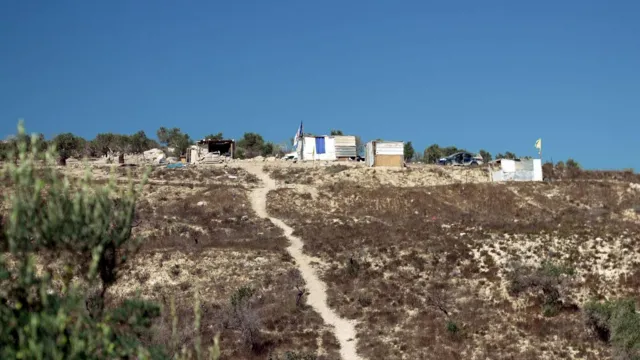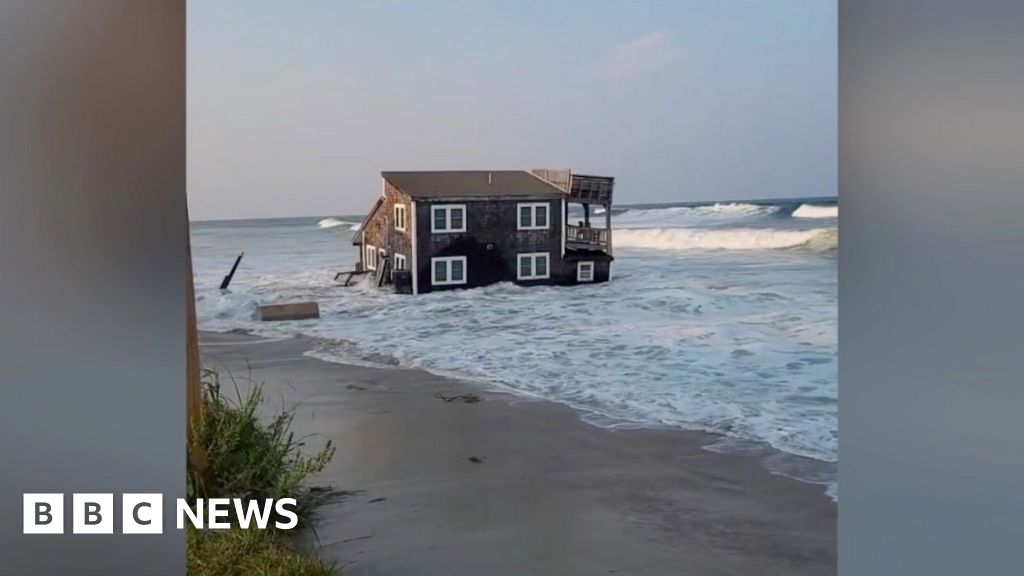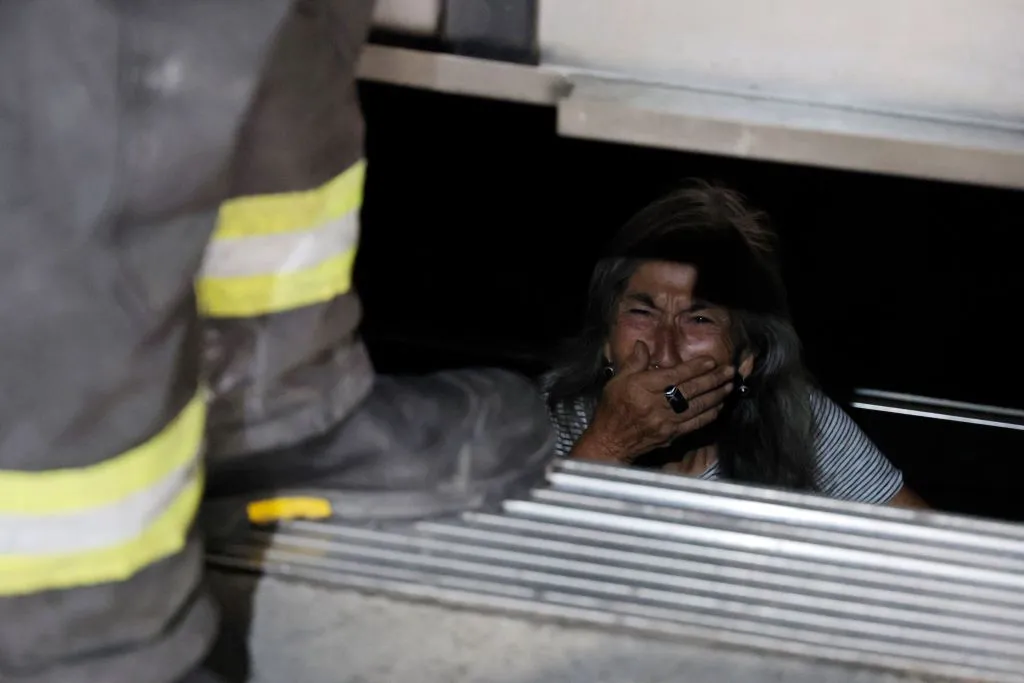Lucy WilliamsonBBC Middle East correspondent in Jenin
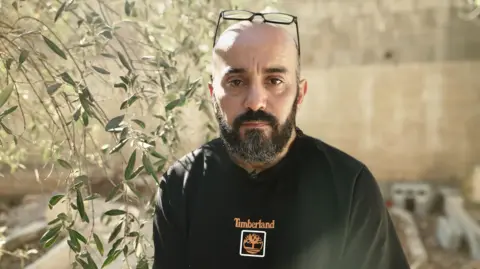 BBC
BBCStates are there to protect. But so are fathers.
Abdel Aziz Majarmeh was standing next to his 13-year-old son, Islam, as he was shot dead by Israeli forces this month at the entrance to Jenin refugee camp, in the occupied West Bank.
“My son fell to the ground, and then I heard the sound of a shot,” he said. “An army jeep came up and five or six soldiers pointed their weapons at me, telling me to leave. I didn’t even know my son was martyred. I started dragging him away.”
Abdel Aziz said he had gone to the camp – occupied by Israel’s army since January – to retrieve family documents from his home there.
“There is no-one for me to complain to,” he told me. “They control everything. The Palestinian Authority can’t even protect itself – it only implements the decisions of the Jews.”
As a Palestinian, Abdel Aziz is resigned to his powerlessness. As a father, he’s tormented.
“In my mind, I keep asking that soldier, ‘why pick on a 13-year-old boy? I’m standing right next to him. Shoot me. Why are you shooting children? I’m here, shoot me’.”
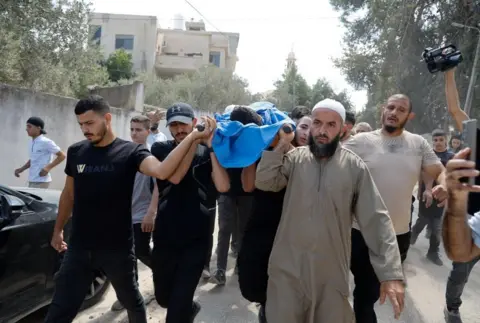 Reuters
ReutersIsrael’s army said it had fired to neutralise a threat posed by suspects who had approached them in a closed military area, and was examining the incident.
It refused to clarify what threat the teenager had posed.
Cities like Jenin were put under the full control of the Palestinian Authority three decades ago, under the Israeli-Palestinian Oslo Peace Accords.
They were meant to be the seeds from which statehood would grow.
But Israel says it was terrorism that flourished there. In January, it sent tanks into Jenin and the neighbouring city of Tulkarem to crush armed Palestinian groups, saying it would apply lessons learned in Gaza.
Since then, Israeli forces have remained, razing large areas of the camps in both cities, and demolishing buildings in other areas.
The UK, France and other countries are now set to recognise a Palestinian state, as Israeli control spreads across the West Bank and the Gaza war grinds on.
Jenin’s mayor, Mohammed Jarrar, took me to the camp entrance near where Islam was shot. The army vehicles stationed here on my previous visits are nowhere to be seen, but a large earth berm now blocks the road in, and locals say Israeli snipers still scan the area from the buildings overhead.
Mr Jarrar told me around 40% of Jenin was now a military area for Israeli forces, with around a quarter of residents – including the entire camp – displaced from their homes.
“It was clear from the beginning this was a major political plan, not a security operation,” he told me. “This Israeli government wants to annex the West Bank and in preparation for that, it wants to prevent any [armed] opposition to its plan.”
Israel has also placed the Palestinian Authority under a long-term economic siege, withholding tax revenues the PA needs to pay teachers and police.
Israel accuses it of funding terrorism by compensating the families of Palestinian militants who are killed. The PA says it has now scrapped that payment scheme.
Mr Jarrar said it was now very challenging to provide even basic services to the local population, and to persuade young people not to leave.
Against this backdrop, he said, the recognition of a Palestinian state by Britain, France and others is important, even after more than 140 other nations have already done so.
“It confirms the fact that the Palestinian people possess a state, even if it is under occupation,” he told me. “I know that this recognition will lead to [greater] occupation of the West Bank. But even so I believe recognition is more important, because it will shape the future of the Palestinian people, and the international community will be called on to defend their rights.”
Recognition of a Palestinian state by the UK and France is also a recognition of the political chasm between Israel and its European allies over this issue.
“There will be no Palestinian state,” Israel’s Prime Minister, Benjamin Netanyahu, told settlers in the West Bank last week. “This place is ours. We will see to our heritage, our land and our security.”
Netanyahu has built his career on preventing a Palestinian state, and his government has pushed hard on expanding settlements in the West Bank.
His far-right allies have been pushing for formal annexation, with Finance Minister Bezalel Smotrich recently outlining a plan to annex 82% of West Bank, with the remaining Palestinian enclaves cut off from each other.
US President Donald Trump has opposed the recognition of a Palestinian state, but has not publicly criticised Israeli moves towards annexation.
Israel seized the West Bank from Jordan in the 1967 Arab-Israeli war, and has never left.
Establishing civilian settlements on occupied land is illegal under the Geneva Conventions, but Israel argues that it has a historic Jewish right to the West Bank.
Around half a million settlers now live there, and the Israeli organisation, Peace Now, which tracks settlement expansion, says more than 100 new outposts have appeared across the West Bank in the past two years.
Outposts are illegal under both international and Israeli law, but they receive tacit approval from Netanyahu’s government as well as state support in the form of roads, security and utilities.
Earlier this summer, Ayman Soufan saw new neighbours arrive on the hill next to his house, in the hills south of Nablus.
From his window, he and his grandchildren have a clear view of the simple wooden shelter and corrugated iron shed put up by Israeli settlers that Ayman says are from the nearby settlement of Yitzhar.
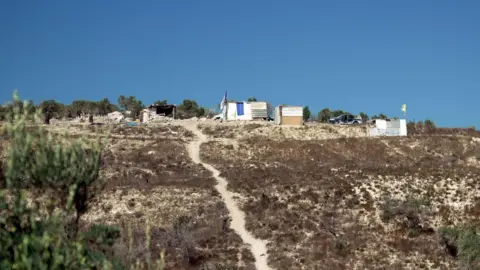
“This outpost they set up here is to push us out of our house. Every day a settler comes, bangs on the house, shouting ‘leave, leave!’,” he told me. “They throw their garbage at our doorstep. I call the authorities and they say, “We’ll send the army”. But the army never comes. The settlers are the army, they are the police, they are everything.”
Ayman’s family built this house, near the village of Burin, a few years after Israel occupied the West Bank in 1967.
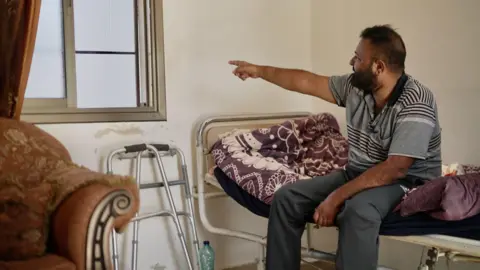
Israel was temporarily given control over rural areas like this under the Oslo peace accords, with the intention that they would eventually be transferred to a future Palestinian State, after negotiations over settlements there.
But Israeli control has remained, settlements have mushroomed, and human rights groups say Israeli forces are increasingly supportive of settler attacks.
Ayman said his father had died from a heart attack as settlers set fire to the house in 2003, and that his home had been torched several more times since then.
“Who is supposed to protect me,” Ayman asked. “The Palestinian police? They can’t even prevent this happening in the cities, how will they come here? Here, my security is in the hands of the people who occupy me.”
International recognition of a Palestinian state is a good thing, he says, even if little will change on the ground.
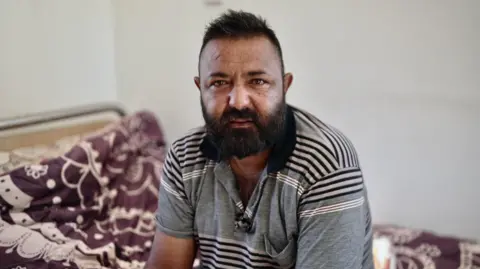
“What’s coming is worse,” he said. “But if I ever leave this house, it’ll be when I’m carried out dead. This house where I was born, where I grew up and lived my childhood; every corner has a memory for me. How can I leave it?”
In the decades since the Oslo Accords, Israeli narratives have hardened, armed Palestinian groups have strengthened, and the control of the Palestinian Authority government has been eaten away.
“Palestine was never theirs and will never be theirs,” said bereaved father Abdel Aziz Majarmeh. “Sooner or later, today, tomorrow, in a year or two, they will leave this country. And Palestine will be liberated.”
The UK and France have clung to the idea that two separate states – Israeli and Palestinian – are the solution to the conflict here, even as Palestinian territory was taken, and Palestinian institutions undermined.
Now the Gaza war, and questions over who will govern Gaza afterwards, have forced that political gridlock into open confrontation, as Netanyahu’s far-right allies push hard for annexation.
Some Israelis say the West Bank is like the Wild West: a place where statehood and sovereignty are decided not by laws and declarations but by facts on the ground.
Israel has long argued there can be no Palestinian state without its agreement.
Now, by pushing ahead with recognition, the UK, France and others are signalling that Israel can’t cancel statehood alone.
A political fact by Israel’s allies to counter its facts on the ground.
